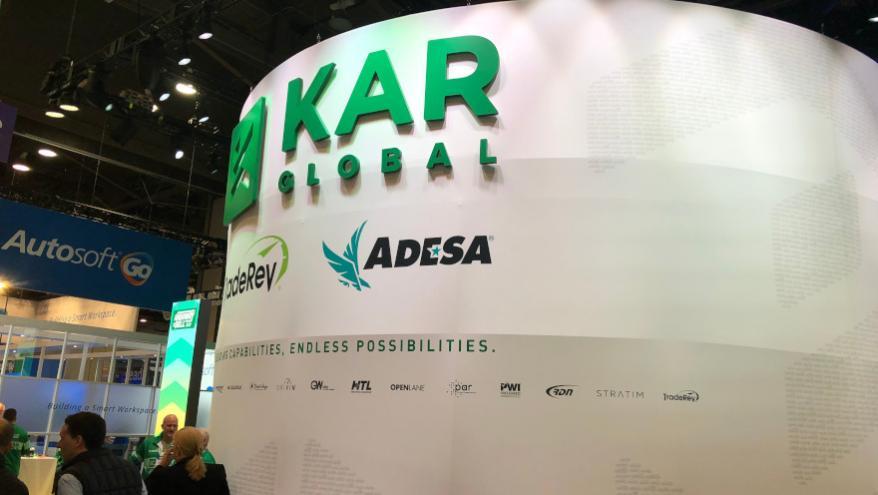Progress at TradeRev among highlights of Q3 at KAR

KAR Global booth at NADA Show 2020. Photo by Joe Overby.
By subscribing, you agree to receive communications from Auto Remarketing and our partners in accordance with our Privacy Policy. We may share your information with select partners and sponsors who may contact you about their products and services. You may unsubscribe at any time.
CARY, N.C. –
Despite challenges that included lower volumes, KAR Global made some big strides in the third quarter, including some progress in its TradeRev business unit, amid a wholesale marketplace that remains largely digital within the company.
Revenue came in at $593.6 million for Q3, down from $701.9 million a year ago. But KAR generated $47.1 million in net income from continuing operations, up from $34.4 million in Q3 2019.
Adjusted EBITDA climbed from $129.2 million to $139.2 million, and operating adjusted net income from continuing operations per diluted share was at $0.45, up from $0.35.
“Really, the bright spots (were) gross profit was up, reflecting the value proposition of a digital marketplace business, as compared to maybe a physically focused auction business in the past, and second was, the ability for us to realign our cost structure in line with current levels of activity,” chief financial officer Eric Loughmiller said in a phone interview Wednesday.
(KAR clarified that the company showed year-over-year and sequential gains in gross profit percent, while gross profit dollars climbed from the second quarter and fell from Q3 2019.)
Along those lines, he added that SG&A expenses as a percentage of revenue were down, which is an area KAR emphasized.
Subscribe to Auto Remarketing to stay informed and stay ahead.
By subscribing, you agree to receive communications from Auto Remarketing and our partners in accordance with our Privacy Policy. We may share your information with select partners and sponsors who may contact you about their products and services. You may unsubscribe at any time.
Where the company had some challenges was with volumes. Within the ADESA business unit, for instance, vehicles sold fell from 957,000 in Q3 2019 to 871,000 in the third quarter of 2020.
“Volume started the quarter very strong, and then moderated,” Loughmiller said. “So, we were challenged, in my opinion, through the third quarter, with a lot of market activity that caused some limitations in the number of cars coming to our marketplaces. But we were able to have a very good quarter, despite that.”
Added chief executive officer Jim Hallett, who was also on the phone interview, “Overall, it was a good quarter. I did mention (during the earnings call) that volumes were really strong in July and got a little bit softer as we got into September.”
Asked about the lower volumes, Loughmiller compared the situation to what KAR faced a decade ago after the Great Recession.
This time around, inventory began to build as the market shut down in the latter half of March
“Volumes were quite strong coming out of that, because the industry was full of inventory looking for a home and retail demand was there, so retailers were looking for cars and we had them,” Loughmiller said.
After that inventory was gobbled up, supply has since “been very tight,” similar to the 2010-2012 market, he said.
“Very expensive to buy cars in the wholesale market … As a result, the dealers look for alternative sources. They retail more of the trades they take in, even if those cars historically would not have been ideal for their retail strategy,” Loughmiller said.
"So generally, strong retail demand is not accompanied by strong wholesale supply because dealers were disintermediating the wholesale auction, so that they could make a profit in a very tight pricing environment,” he said. “The other part of this is, retail prices did not increase at the same level as wholesale prices over the summer months. So, they were getting squeezed on gross profit and that's when we typically will see them retail more trades and things like that.”
Loughmiller did note that he believes this situation to be “temporary.” And it was not unexpected, either.
“The volumes we’re experiencing now were the volumes we thought we would be experiencing this fall as COVID-19 impacted our business,” he said. “So, the surprise was June and July, not now."
Conversely, one area that KAR has seen some major volumes gains has been at TradeRev.
Volumes climbed 22% in Q3, with the rate of growth increasing each month, capping the quarter at 30% in September, Hallett said during the earnings call.
“I like the traction that we're seeing in this space, and we are getting this done without incurring losses in the business,” Hallett said in the earnings call. “And to what do I attribute the improved performance of TradeRev?
“First, we have simplified the platform in the U.S. We have listened to our customers, and we made changes to make the TradeRev app easier to use. And we've eliminated the cage match, making it easier for buyers to move quickly when they have won the car. Secondly, we continue to build our buyer base. We believe that this is the key to winning the dealer-to-dealer space in the long run. And last, we have made strides in bringing the ADESA customers into the TradeRev marketplace by enhancing the visibility to inventory on all of our platforms when logging into the adesa.com site.”
KAR has enrolled over 15,000 additional dealers across online marketplaces who had never transacted digitally in the past. Additionally, they have had 12,000 first-time buyers on their ADESA Simulcast platform since April.
“I think that's just reinforcement of just how resilient these dealers are in terms of what they'll do to get the job done and manage the business,” Hallett said in the follow-up call.


